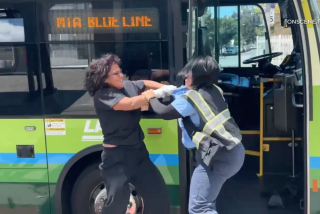Uber’s latest bid to win over drivers: 24/7 phone support
Reporting from San Francisco — Uber added a 24-hour phone help line and a slew of new features and policy changes Tuesday in an attempt to appease drivers, who have long complained the San Francisco ride-hailing company doesn’t do enough to support them.
The move is part of what Uber is calling its “180 Days of Change” — a campaign launched after a string of scandals that led to the resignation of its chief executive, Travis Kalanick, in June.
The company kicked off the initiative last month by adding tipping to the Uber app — a feature that drivers had demanded for years.
“We’ve been doing a lot of listening over the past several months, whether it’s riding with driver partners and talking to them, or hearing what they’ve had to say on social media and email, we’re trying to get a sense of what the pain points are for drivers and how we can improve their experience,” said Chris Ballard, general manager for Uber’s southwest region, which include Los Angeles.
Some of the changes that will be rolled out starting Tuesday include:
- 24/7 phone support for drivers. The feature will first be available in Los Angeles, San Diego and San Francisco before arriving in other cities by the end of 2017. The company plans to offer phone support in Spanish in September. Wait times are expected to be less than two minutes, Ballard said, and support staff will be a mix of employees and contractors located in the U.S. and abroad.
- Fare adjustment. If a driver forgets to tell the Uber app that a trip has started or ended, or if a trip destination ends up being farther than what was initially requested, drivers will be able to update the trip via the Uber website (and, soon, in the app) and change the fare. Passengers will receive updated receipts and an explanation for fare changes.
- Tweaks to make policies more fair. The company has reviewed more than 100 policies, Ballard said, and has made tweaks to ensure they’re fair and driver-friendly. One such tweak is to the three-strikes policy. Drivers previously had their accounts put on hold if they received three passenger complaints about dangerous driving. This policy didn’t take into account whether a driver had performed 10 rides or 10,000 rides, though. The updated policy will look at rolling averages, instead of adhering to a strict rule of three strikes and you’re out.
- $15 fee for lost and found. Drivers commonly complained that if a passenger left something in their car, they would often have to drive great distances to return the item without being compensated for their time. Uber will now charge passengers a $15 fee, which will be passed along to the driver. Passengers will have an opportunity to contest the fee if they believe some kind of fraud has occurred.
- Driver ratings. If a passenger gives a driver a poor rating over something outside the driver’s control — say, traffic — it will not count toward the driver’s overall rating.
While many of the changes may seem “in the weeds,” they can have a significant effect on driver experience, especially for those who do lots of rides, Ballard said.
Drivers welcomed the changes on online forums and in Facebook groups, saying phone support and compensation for returning lost items was long overdue. Some drivers in Los Angeles, such as Michael Goodman, 61, of Northridge, had access to the phone support last month and described it as a vast improvement on the email system the company previously used, which he said “typically produced nonsensical or irrelevant responses.”
But drivers’ biggest request — and one that shows few signs of coming — is an increase in wages from low-cost rides such as UberX and UberPool, Goodman said.
“Gas prices are likely to jump when the new gas taxes hit,” he said. “Nothing affects my income more than the rates and changes in the price of gas.”
While the changes don’t fulfill every driver demand, they mark a shift in the company’s attitude toward drivers.
Under Uber’s former leadership, the company steadfastly held out against adding a tipping option and, despite having hundreds of thousands of drivers across the country, did not offer a phone number that drivers could call if they had questions. When drivers complained about passengers giving them unwarranted poor ratings, or time wasted returning items that passengers left behind, they were often met with generic email responses.
Drivers have taken their frustrations with Uber to the courts, filing lawsuits alleging that the company misclassified them as independent contractors, in effect stripping them of benefits such as expense reimbursement, wage protections and sick days. The most high profile of such cases — a class-action lawsuit being waged in California — is still unresolved.
The campaign to ingratiate itself with drivers is another sign that the war for drivers between Uber and Lyft continues to rage, with both firms trying to one-up each other as the better place for drivers to work.
“We’re trying to improve all aspects of the driver experience,” Ballard said. “We’re putting our money where our mouth is.”
Twitter: @traceylien
ALSO
Travis Kalanick is no longer Uber’s CEO, but drivers still want him on the hook in lawsuit
Uber driver accused of kidnapping, sexually assaulting intoxicated female passenger
Want your Lyft driver to stop at Taco Bell? There’s a new in-app option for that
Lyft forms an autonomous vehicle unit
UPDATES:
2 p.m.: This article was updated with comments from Uber drivers.
This article was originally published at 9 a.m.







